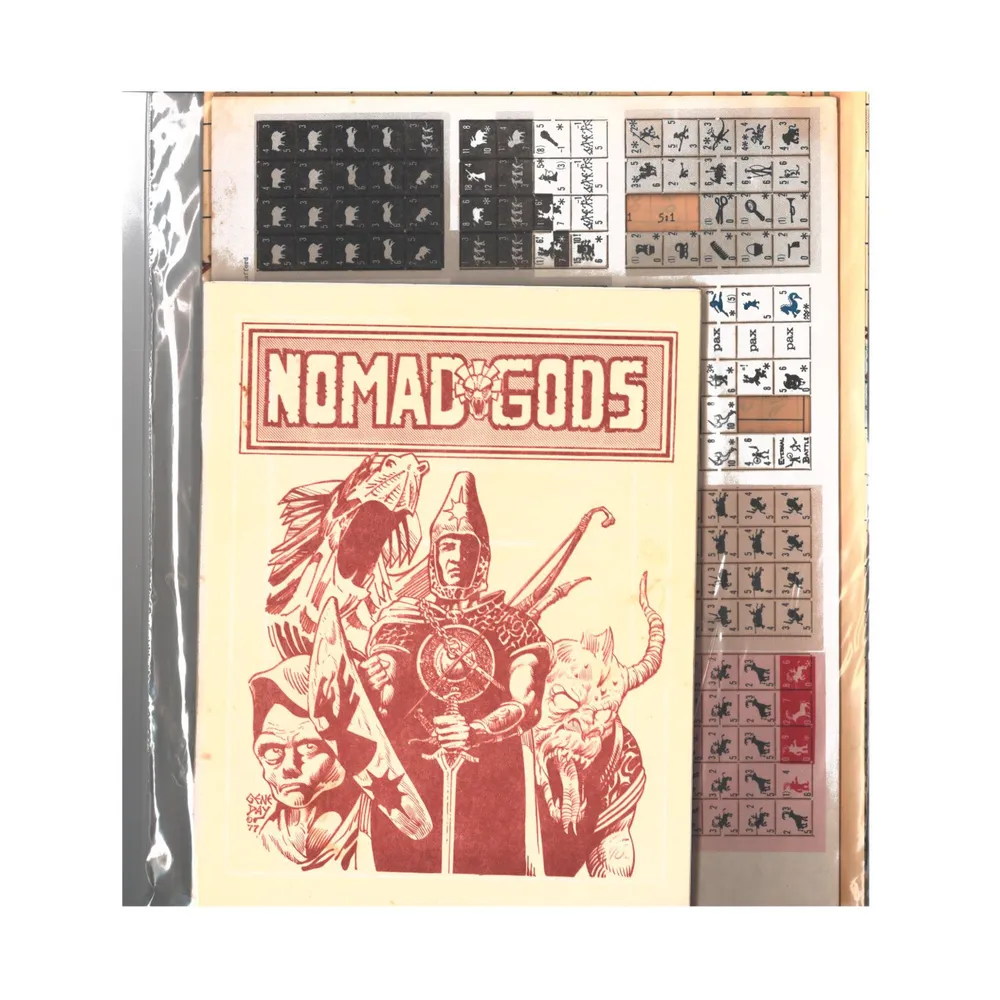Nomad Gods (1977)
Nomad Gods: A Fantasy Wargame by Greg Stafford
Nomad Gods is a fantasy wargame designed by Greg Stafford and published by Chaosium in 1977. It is the second part of the Dragon Pass trilogy, which began with White Bear and Red Moon. The game is set on the Plains of Prax and involves players moving armies composed of the five tribes of Prax: the Bison, the Morokanth, the Sable, the Wolf, and the Crane. Although the third game of the trilogy was never published, rules updates and additions were published in Wyrm’s Footnotes.The game comes with a 22″ x 26″ hex map, 252 counters, and a profusely illustrated 72-page rulebook. In 1994, the game was revised and released as Les Dieux Nomades in French by Oriflam. The rulebook was republished without the counters and map in 2017 by Chaosium as part of their Khan of Khans Kickstarter.
Significance of Nomad Gods
Nomad Gods is popular and significant for several reasons:
– Designer: Greg Stafford, a well-known game designer, created the game.
– Fantasy Board Wargame: The game combines fantasy elements with wargame mechanics, offering a unique gaming experience.
– Positive Reviews: The game has received positive reviews, with one reviewer giving it an overall rating of 9 out of 10.
– Popularity: The game is popular among fans of fantasy board games and wargames, and it has been praised for its stimulating gameplay and easy-to-learn rules.
Game Components of Nomad Gods
Nomad Gods includes the following Game Components of Nomad Gods:
– 22″ x 26″ hex map
– 252 counters
– 72-page rulebook
Game Setup of Nomad Gods
To set up the game, follow these steps:
– Unfold the hex map and place it on a flat surface.
– Shuffle the 252 counters and place them in a draw pile.
– Each player chooses a tribe and takes turns selecting counters to form their army.
Gameplay Mechanics of Nomad Gods
The Gameplay Mechanics of Nomad Gods of Nomad Gods are as follows:
– Players take turns moving their armies across the hex map.
– The goal is to capture territories and defeat opposing armies.
– The game includes rules for combat, movement, and special abilities for each tribe.
Game Objective of Nomad Gods
The objective of Nomad Gods is to capture territories and defeat opposing armies while following the game’s rules and mechanics.
Player Experience
Nomad Gods offers a challenging and immersive player experience, with its fantasy setting and in-depth rules providing a unique and engaging gameplay experience.You can purchase Nomad Gods online through various retailers, such as BoardGameGeek and Chaosium’s website. The game is available in both English and French languages, with the French edition published by Oriflam.In conclusion, Nomad Gods is a popular and significant fantasy wargame designed by Greg Stafford. The game offers a unique blend of fantasy elements and wargame mechanics, providing players with an engaging and challenging experience.
Game Components of Nomad Gods
How To Setup Nomad Gods
To set up *Nomad Gods*, players need to lay out the hex map of the Plains of Prax and distribute the counters according to the scenario being played. Each player selects a nomadic tribe, such as the Bison Tribe, Impala People, High Llama Riders, Sable Riders, or Morokanth, and places their units on the board. The game includes specific setup instructions for each of the six different scenarios provided in the rulebook.
Gameplay Mechanics and Game Objective
Player Experience
Playing *Nomad Gods* is an immersive experience, especially for those interested in the richly detailed world of Glorantha. The game offers a complex and engaging setup, with well-organized rules that, despite their complexity, are readable and easy to follow. Players appreciate the unique setting, where tribes ride exotic steeds like bison, llamas, and antelopes, and engage in magical combat and tribal rituals. The game’s depth and the variety of scenarios make it highly replayable.
Pros
Cons
Personal Thoughts on Nomad Gods
*Nomad Gods* is a game for those who appreciate deep, immersive gameplay and are fascinated by richly detailed fantasy worlds. It is particularly suitable for fans of the Glorantha setting and those who enjoy complex wargames with a unique twist. While it may not be the best introduction for new players due to its complexity, it is a gem for experienced gamers looking to explore a unique and engaging fantasy environment. For those interested in the setting but not the board game itself, the rulebook and associated lore can still be invaluable, especially for role-playing enthusiasts of RuneQuest and its supplements.
We are supported by our audience. When you purchase through links on our site, we may earn an affiliate commission, at no extra cost for you. Learn more.

